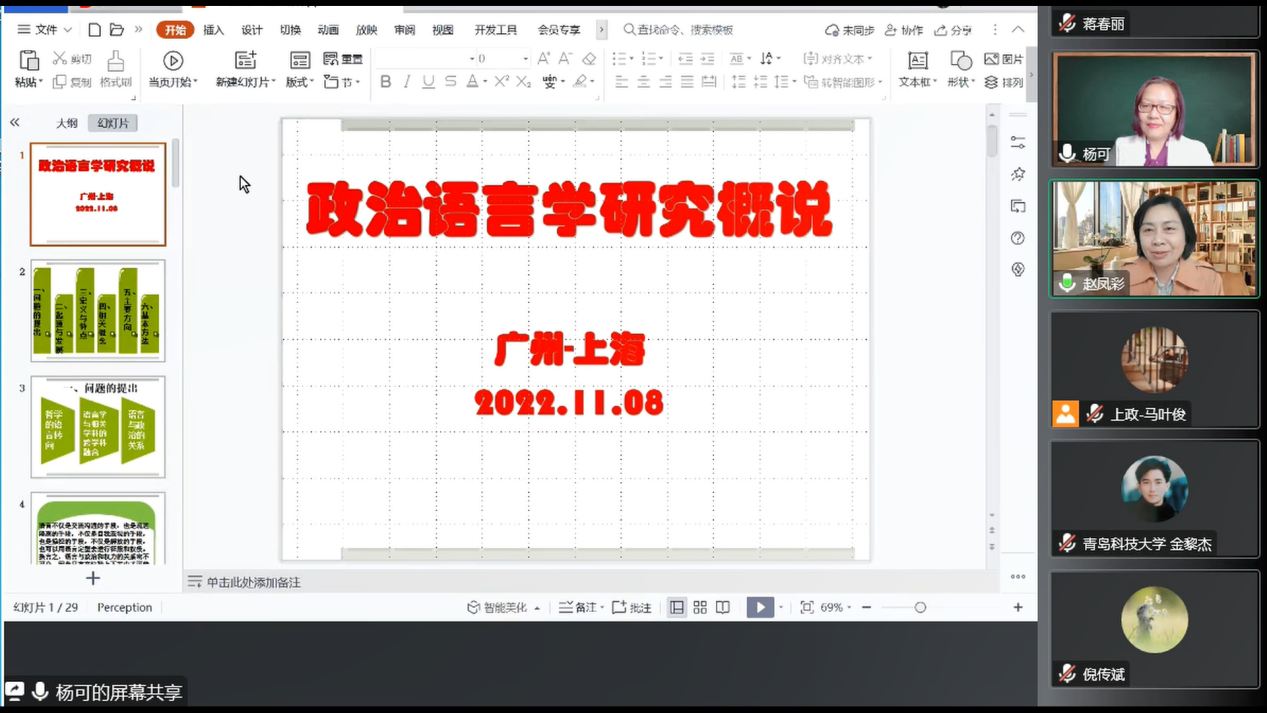On the afternoon of November 8th, the School of Language and Culture (School of International Exchange) held the twenty-seventh lecture of the language and culture forum, inviting the Dean of the School of Western Languages and Culture and the Deputy Dean of the National and Regional Institute for Higher Education of Guangdong University of Foreign Studies, Professor Yang Ke, a member of the Russian Subcommittee of the Teaching Steering Committee of the Ministry of Education, gave an online lecture entitled An Introduction to Political Linguistics Research for teachers and students. The lecture was hosted by Associate Professor Zhao Fengcai, director of the Russian Teaching and Research Section of the School of Language and Culture. Nearly 200 teachers and students attended the online meeting.

Professor Yang first introduced the relevant issues of political linguistics from six aspects: the realistic background, origin, definition, related concepts and terms, research content, and basic research methods of contemporary political linguistics. The origin of political linguistics can be traced back to the eloquence of ancient Greece and Rome. For contemporary Russia, its emergence and development are closely related to the social reality after the disintegration of the Soviet Union and the development of pragmatics such as rhetoric and stylistics. Political linguistics embodies distinct interdisciplinary characteristics, and absorbs multidisciplinary research methods, including anthropocentrism, functionality, interpretation and so on. The current research content mainly focuses on the basic theory of political linguistics, the study of various language levels of political discourse, the genre and style of political discourse, the personality and style characteristics of politicians, political parties and political factions, political communication strategies, tactics and means, diachronic and synchronic comparative studies, etc. The main research methods include conceptual metaphors, discourse analysis, linguistic and cultural methods, and precedent phenomena in texts. The leader of contemporary Russian political linguistics is Professor Chudinov of the Ural School, whose series of monographs detail the research and development of modern Russian political linguistics.
Professor Yang thought that political linguistics in China started at the beginning of the 21st century. At first, it mainly translated and introduced foreign related achievements, and had not yet formed a conscious awareness. Under the unremitting efforts of academic teams such as Guangdong University of Foreign Studies, Dalian University of Foreign Studies and Tianjin University of Foreign Studies, our country's political linguistics research has made great progress in the past ten years. The research content has shifted from translation and introduction to theoretical construction and applied research.
At the end of the lecture, Professor Yang interacted with the teachers and students and patiently answered the questions raised by them. At the same time, according to the characteristics of the discipline of our university, he proposed some research directions for the teachers and students of the School of Languages, such as the political narrative of the SCO countries, etc. This lecture is rich in connotation, forward-looking and leading, which not only deepened the understanding of the participating teachers and students on political linguistics at home and abroad, but also inspired scientific research ideas and broadened their academic horizons.
School of Language and Culture (School of International Exchange)
November 9, 2022







